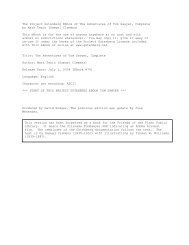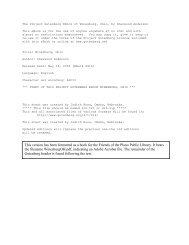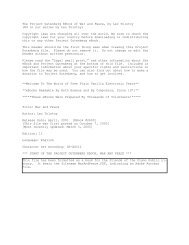- Page 1:
**The Project Gutenberg Etext of Mo
- Page 4 and 5:
Chapter 20 The Astir 79 Chapter 21
- Page 6 and 7:
Chapter 62 The Dart 241 Chapter 63
- Page 8 and 9:
Chapter 104 The Fossil Whale 385 Ch
- Page 10 and 11:
MOBY DICK; OR THE WHALE by Herman M
- Page 12 and 13:
“The Indian Sea breedeth the most
- Page 14 and 15:
“We set sail from the Elbe, wind
- Page 16 and 17:
“In 40 degrees south, we saw Sper
- Page 18 and 19:
“Nantucket itself,” said Mr. We
- Page 21 and 22:
Moby Dick or The Whale CHAPTER 1 Lo
- Page 23 and 24:
Moby Dick or The Whale and distinct
- Page 25 and 26:
Moby Dick or The Whale CHAPTER 2 Th
- Page 27 and 28:
Moby Dick or The Whale a marvellous
- Page 29 and 30:
Moby Dick or The Whale handle sweep
- Page 31 and 32:
Moby Dick or The Whale A tramping o
- Page 33 and 34:
Moby Dick or The Whale ishing unwar
- Page 35 and 36:
Moby Dick or The Whale I considered
- Page 37 and 38:
Moby Dick or The Whale address him,
- Page 39 and 40:
Moby Dick or The Whale clean, comel
- Page 41 and 42:
Moby Dick or The Whale and the befo
- Page 43 and 44:
Moby Dick or The Whale I quickly CH
- Page 45 and 46:
Moby Dick or The Whale CHAPTER 6 Th
- Page 47 and 48:
Moby Dick or The Whale I N CHAPTER
- Page 49 and 50:
Moby Dick or The Whale CHAPTER 8 Th
- Page 51 and 52:
Moby Dick or The Whale F ATHER CHAP
- Page 53 and 54:
Moby Dick or The Whale ing murderer
- Page 55 and 56:
Moby Dick or The Whale grow their s
- Page 57 and 58:
Moby Dick or The Whale than the kel
- Page 59 and 60:
Moby Dick or The Whale night previo
- Page 61 and 62:
Moby Dick or The Whale CHAPTER 11 N
- Page 63 and 64:
Moby Dick or The Whale Q UEEQUEG CH
- Page 65 and 66:
Moby Dick or The Whale CHAPTER 13 W
- Page 67 and 68:
Moby Dick or The Whale savage caugh
- Page 69 and 70:
Moby Dick or The Whale N OTHING CHA
- Page 71 and 72:
Moby Dick or The Whale CHAPTER 15 C
- Page 73 and 74:
Moby Dick or The Whale and chowder
- Page 75 and 76:
Moby Dick or The Whale You may have
- Page 77 and 78:
Moby Dick or The Whale “Well, sir
- Page 79 and 80:
Moby Dick or The Whale omalously mo
- Page 81 and 82:
Moby Dick or The Whale I thought hi
- Page 83 and 84:
Moby Dick or The Whale As he thunde
- Page 85 and 86:
Moby Dick or The Whale that sweet g
- Page 87 and 88:
Moby Dick or The Whale door was loc
- Page 89 and 90:
Moby Dick or The Whale “For heave
- Page 91 and 92:
Moby Dick or The Whale CHAPTER 18 H
- Page 93 and 94:
Moby Dick or The Whale When all pre
- Page 95 and 96:
Moby Dick or The Whale CHAPTER 19 T
- Page 97 and 98:
Moby Dick or The Whale “ALL about
- Page 99 and 100:
Moby Dick or The Whale CHAPTER 20 A
- Page 101 and 102:
Moby Dick or The Whale I T CHAPTER
- Page 103 and 104:
Moby Dick or The Whale of the poor.
- Page 105 and 106:
Moby Dick or The Whale CHAPTER 22 M
- Page 107 and 108:
Moby Dick or The Whale “Sweet fie
- Page 109 and 110:
Moby Dick or The Whale S CHAPTER 23
- Page 111 and 112:
Moby Dick or The Whale Why did the
- Page 113 and 114:
Moby Dick or The Whale Oh, that’s
- Page 115 and 116:
Moby Dick or The Whale CHAPTER 26 K
- Page 117 and 118:
Moby Dick or The Whale mounts; if I
- Page 119 and 120:
Moby Dick or The Whale The third ma
- Page 121 and 122:
Moby Dick or The Whale for, to the
- Page 123 and 124:
Moby Dick or The Whale There seemed
- Page 125 and 126:
Moby Dick or The Whale CHAPTER 29 E
- Page 127 and 128:
Moby Dick or The Whale a sort of qu
- Page 129 and 130:
Moby Dick or The Whale N leg, well
- Page 131 and 132:
Moby Dick or The Whale CHAPTER 32 C
- Page 133 and 134:
Moby Dick or The Whale First: The u
- Page 135 and 136:
Moby Dick or The Whale the identity
- Page 137 and 138:
Moby Dick or The Whale but his back
- Page 139 and 140: Moby Dick or The Whale seen of him
- Page 141 and 142: Moby Dick or The Whale CHAPTER 33 T
- Page 143 and 144: Moby Dick or The Whale CHAPTER 34 T
- Page 145 and 146: Moby Dick or The Whale vate, that e
- Page 147 and 148: Moby Dick or The Whale I T CHAPTER
- Page 149 and 150: Moby Dick or The Whale called the t
- Page 151 and 152: Moby Dick or The Whale tonists have
- Page 153 and 154: Moby Dick or The Whale When the ent
- Page 155 and 156: Moby Dick or The Whale “Captain A
- Page 157 and 158: Moby Dick or The Whale Receiving th
- Page 159 and 160: Moby Dick or The Whale CHAPTER 37 S
- Page 161 and 162: Moby Dick or The Whale CHAPTER 38 D
- Page 163 and 164: Moby Dick or The Whale HARPOONEERS
- Page 165 and 166: Moby Dick or The Whale (THEY CEASE
- Page 167 and 168: Moby Dick or The Whale royal yard!
- Page 169 and 170: Moby Dick or The Whale those things
- Page 171 and 172: Moby Dick or The Whale It is a thin
- Page 173 and 174: Moby Dick or The Whale days and wee
- Page 175 and 176: Moby Dick or The Whale W HAT CHAPTE
- Page 177 and 178: Moby Dick or The Whale forth its va
- Page 179 and 180: Moby Dick or The Whale Let us try.
- Page 181 and 182: Moby Dick or The Whale that savage
- Page 183 and 184: Moby Dick or The Whale “Tish! the
- Page 185 and 186: Moby Dick or The Whale hint, attemp
- Page 187 and 188: Moby Dick or The Whale pondering ca
- Page 189: Moby Dick or The Whale Secondly: It
- Page 193 and 194: Moby Dick or The Whale a rock; but
- Page 195 and 196: Moby Dick or The Whale CHAPTER 46 S
- Page 197 and 198: Moby Dick or The Whale CHAPTER 47 T
- Page 199 and 200: Moby Dick or The Whale But at this
- Page 201 and 202: Moby Dick or The Whale “Spread yo
- Page 203 and 204: Moby Dick or The Whale periodically
- Page 205 and 206: Moby Dick or The Whale “Pull, pul
- Page 207 and 208: Moby Dick or The Whale boat seemed
- Page 209 and 210: Moby Dick or The Whale “Can’t y
- Page 211 and 212: Moby Dick or The Whale tously cutti
- Page 213 and 214: Moby Dick or The Whale the eager gl
- Page 215 and 216: Moby Dick or The Whale CHAPTER 52 T
- Page 217 and 218: Moby Dick or The Whale CHAPTER 53 T
- Page 219 and 220: Moby Dick or The Whale tude. Hence,
- Page 221 and 222: Moby Dick or The Whale (AS TOLD AT
- Page 223 and 224: Moby Dick or The Whale whose red pa
- Page 225 and 226: Moby Dick or The Whale and wiping t
- Page 227 and 228: Moby Dick or The Whale man arches o
- Page 229 and 230: Moby Dick or The Whale cursed jaw;
- Page 231 and 232: Moby Dick or The Whale eries togeth
- Page 233 and 234: Moby Dick or The Whale tween this w
- Page 235 and 236: Moby Dick or The Whale with some ta
- Page 237 and 238: Moby Dick or The Whale ‘This is t
- Page 239 and 240: Moby Dick or The Whale ter into the
- Page 241 and 242:
Moby Dick or The Whale shape. Thoug
- Page 243 and 244:
Moby Dick or The Whale fault might
- Page 245 and 246:
Moby Dick or The Whale CHAPTER 57 O
- Page 247 and 248:
Moby Dick or The Whale With a friga
- Page 249 and 250:
Moby Dick or The Whale for example,
- Page 251 and 252:
Moby Dick or The Whale CHAPTER 59 S
- Page 253 and 254:
Moby Dick or The Whale By some natu
- Page 255 and 256:
Moby Dick or The Whale bulky freigh
- Page 257 and 258:
Moby Dick or The Whale I F CHAPTER
- Page 259 and 260:
Moby Dick or The Whale “Woo-hoo!
- Page 261 and 262:
Moby Dick or The Whale CHAPTER 62 T
- Page 263 and 264:
Moby Dick or The Whale O UT CHAPTER
- Page 265 and 266:
Moby Dick or The Whale CHAPTER 64 S
- Page 267 and 268:
Moby Dick or The Whale live meat wi
- Page 269 and 270:
Moby Dick or The Whale “No use go
- Page 271 and 272:
Moby Dick or The Whale cook. What!
- Page 273 and 274:
Moby Dick or The Whale into the hug
- Page 275 and 276:
Moby Dick or The Whale *The whaling
- Page 277 and 278:
Moby Dick or The Whale One of the a
- Page 279 and 280:
Moby Dick or The Whale In life, the
- Page 281 and 282:
Moby Dick or The Whale CHAPTER 69 T
- Page 283 and 284:
Moby Dick or The Whale CHAPTER 70 T
- Page 285 and 286:
Moby Dick or The Whale H AND CHAPTE
- Page 287 and 288:
Moby Dick or The Whale cringed, and
- Page 289 and 290:
Moby Dick or The Whale Soon Starbuc
- Page 291 and 292:
Moby Dick or The Whale So strongly
- Page 293 and 294:
Moby Dick or The Whale “It was no
- Page 295 and 296:
Moby Dick or The Whale broken glass
- Page 297 and 298:
Moby Dick or The Whale “How old d
- Page 299 and 300:
Moby Dick or The Whale H ERE, CHAPT
- Page 301 and 302:
Moby Dick or The Whale gan. The ear
- Page 303 and 304:
Moby Dick or The Whale C ROSSING CH
- Page 305 and 306:
Moby Dick or The Whale of those bli
- Page 307 and 308:
Moby Dick or The Whale iron or wood
- Page 309 and 310:
Moby Dick or The Whale silken pearl
- Page 311 and 312:
Moby Dick or The Whale “Man overb
- Page 313 and 314:
Moby Dick or The Whale Now, had Tas
- Page 315 and 316:
Moby Dick or The Whale man himself,
- Page 317 and 318:
Moby Dick or The Whale regard almos
- Page 319 and 320:
Moby Dick or The Whale His necessit
- Page 321 and 322:
Moby Dick or The Whale loose, chiva
- Page 323 and 324:
Moby Dick or The Whale the strength
- Page 325 and 326:
Moby Dick or The Whale What other m
- Page 327 and 328:
Moby Dick or The Whale T HERE CHAPT
- Page 329 and 330:
Moby Dick or The Whale creation, an
- Page 331 and 332:
Moby Dick or The Whale veh, a city
- Page 333 and 334:
Moby Dick or The Whale still less f
- Page 335 and 336:
Moby Dick or The Whale carries a su
- Page 337 and 338:
Moby Dick or The Whale the jet is f
- Page 339 and 340:
Moby Dick or The Whale overwhelmed
- Page 341 and 342:
Moby Dick or The Whale *Though all
- Page 343 and 344:
Moby Dick or The Whale waters known
- Page 345 and 346:
Moby Dick or The Whale her own chos
- Page 347 and 348:
Moby Dick or The Whale times like t
- Page 349 and 350:
Moby Dick or The Whale ously situat
- Page 351 and 352:
Moby Dick or The Whale T HE CHAPTER
- Page 353 and 354:
Moby Dick or The Whale The schools
- Page 355 and 356:
Moby Dick or The Whale These are sc
- Page 357 and 358:
Moby Dick or The Whale CHAPTER 90 H
- Page 359 and 360:
Moby Dick or The Whale longs to the
- Page 361 and 362:
Moby Dick or The Whale “There’s
- Page 363 and 364:
Moby Dick or The Whale All their no
- Page 365 and 366:
Moby Dick or The Whale Presently a
- Page 367 and 368:
Moby Dick or The Whale some already
- Page 369 and 370:
Moby Dick or The Whale superb; then
- Page 371 and 372:
Moby Dick or The Whale man comes at
- Page 373 and 374:
Moby Dick or The Whale Come; let us
- Page 375 and 376:
Moby Dick or The Whale CHAPTER 95 T
- Page 377 and 378:
Moby Dick or The Whale CHAPTER 96 T
- Page 379 and 380:
Moby Dick or The Whale ness of dark
- Page 381 and 382:
Moby Dick or The Whale CHAPTER 97 T
- Page 383 and 384:
Moby Dick or The Whale ashes of the
- Page 385 and 386:
Moby Dick or The Whale It so chance
- Page 387 and 388:
Moby Dick or The Whale “Shall I c
- Page 389 and 390:
Moby Dick or The Whale CHAPTER 100
- Page 391 and 392:
Moby Dick or The Whale “It was he
- Page 393 and 394:
Moby Dick or The Whale to make it;
- Page 395 and 396:
Moby Dick or The Whale CHAPTER 101
- Page 397 and 398:
Moby Dick or The Whale During my re
- Page 399 and 400:
Moby Dick or The Whale CHAPTER 102
- Page 401 and 402:
Moby Dick or The Whale Now, when wi
- Page 403 and 404:
Moby Dick or The Whale I N CHAPTER
- Page 405 and 406:
Moby Dick or The Whale CHAPTER 104
- Page 407 and 408:
Moby Dick or The Whale malehs. Who
- Page 409 and 410:
Moby Dick or The Whale while the ca
- Page 411 and 412:
Moby Dick or The Whale Noah’s flo
- Page 413 and 414:
Moby Dick or The Whale soft cymball
- Page 415 and 416:
Moby Dick or The Whale der the unco
- Page 417 and 418:
Moby Dick or The Whale The Deck--Fi
- Page 419 and 420:
Moby Dick or The Whale I thought, s
- Page 421 and 422:
Moby Dick or The Whale CHAPTER 109
- Page 423 and 424:
Moby Dick or The Whale “Thou art
- Page 425 and 426:
Moby Dick or The Whale there from h
- Page 427 and 428:
Moby Dick or The Whale tongues had
- Page 429 and 430:
Moby Dick or The Whale CHAPTER 111
- Page 431 and 432:
Moby Dick or The Whale Now, for pru
- Page 433 and 434:
Moby Dick or The Whale enough would
- Page 435 and 436:
Moby Dick or The Whale CHAPTER 114
- Page 437 and 438:
Moby Dick or The Whale A ND CHAPTER
- Page 439 and 440:
Moby Dick or The Whale and then loo
- Page 441 and 442:
Moby Dick or The Whale “Oh, trebl
- Page 443 and 444:
Moby Dick or The Whale “And when
- Page 445 and 446:
Moby Dick or The Whale Curse thee,
- Page 447 and 448:
Moby Dick or The Whale “Avast Stu
- Page 449 and 450:
Moby Dick or The Whale “No, no, i
- Page 451 and 452:
Moby Dick or The Whale and still mo
- Page 453 and 454:
Moby Dick or The Whale CHAPTER 121
- Page 455 and 456:
Moby Dick or The Whale CHAPTER 122
- Page 457 and 458:
Moby Dick or The Whale Ere knocking
- Page 459 and 460:
Moby Dick or The Whale CHAPTER 124
- Page 461 and 462:
Moby Dick or The Whale Accessory, p
- Page 463 and 464:
Moby Dick or The Whale “I hold th
- Page 465 and 466:
Moby Dick or The Whale CHAPTER 126
- Page 467 and 468:
Moby Dick or The Whale “And shall
- Page 469 and 470:
Moby Dick or The Whale “Sing, sir
- Page 471 and 472:
Moby Dick or The Whale CHAPTER 128
- Page 473 and 474:
Moby Dick or The Whale the earnest
- Page 475 and 476:
Moby Dick or The Whale He must be u
- Page 477 and 478:
Moby Dick or The Whale hat slouched
- Page 479 and 480:
Moby Dick or The Whale “Your hat,
- Page 481 and 482:
Moby Dick or The Whale But the sudd
- Page 483 and 484:
Moby Dick or The Whale in her heart
- Page 485 and 486:
Moby Dick or The Whale Sleep? Aye,
- Page 487 and 488:
Moby Dick or The Whale Tashtego sta
- Page 489 and 490:
Moby Dick or The Whale In long Indi
- Page 491 and 492:
Moby Dick or The Whale Ahab in the
- Page 493 and 494:
Moby Dick or The Whale The day was
- Page 495 and 496:
Moby Dick or The Whale the becalmed
- Page 497 and 498:
Moby Dick or The Whale limit, such
- Page 499 and 500:
Moby Dick or The Whale “Oh, oh, o
- Page 501 and 502:
Moby Dick or The Whale T E CHAPTER
- Page 503 and 504:
Moby Dick or The Whale both grow ol
- Page 505 and 506:
Moby Dick or The Whale “Drive, dr
- Page 507 and 508:
Moby Dick or The Whale whale’s sp
- Page 509 and 510:
Moby Dick or The Whale Diving benea
- Page 511 and 512:
Moby Dick or The Whale Epilogue “
- Page 513 and 514:
****** To access Project Gutenberg
- Page 515:
the case, for instance, with most w










